Spells
How many of us played "make-believe" magical scenarios, mumbled spells, and "made something happen", or at least wished they were magical once or twice? The world of Magic has always been in our childhood, and still does to this day in animated series, live action TV shows, and even movies.
Writing your own Book of Spells is no easy task: you have to gather all your spells, enchantments, rituals, and charms, and this takes time. It's definitely not for everybody.
The most nostalgic of us can remember many witches and wizards from our childhoods: Merlin and Morgana, from the legendary tales of King Arthur, Gandalf, the Grey from the Lord of the Rings series, and Presto, from the Dungeons and Dragons cartoon. More recently, we had Alex Russo and her family from "The Wizards of Waverly Place", and Doctor Strange and the Scarlet Witch from the Marvel Cinematic Universe. Even the iconic Mickey Mouse is a wizard in the "Fantasia" animated movie, whereas Donald, the Duck is also a mage in the Kingdom Hearts video game franchise.
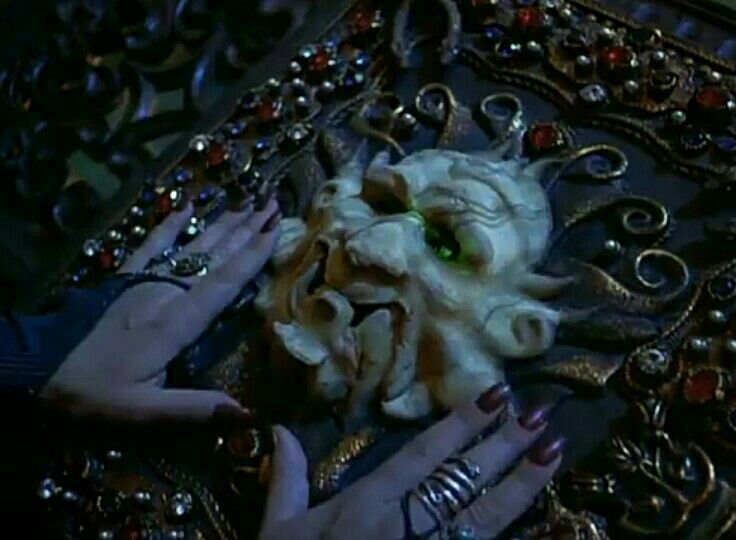
Venture into Spellbook, learn new spells, and write your own Book of Spells!
Game Info
Spellbook is a board game played with 1 to 4 players, for ages 12 and up, by designer Phil Walker-Harding. It was illustrated by Cyrille Bertin.
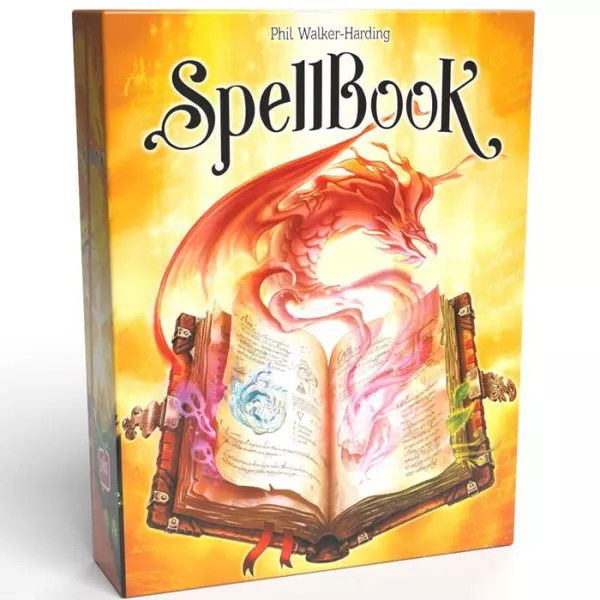
It was released in 2023 by Space Cowboys in the English-speaking world, and in that same year in other countries. Its base mechanics are: collecting sets and hand management.
As a matter of fact, Phil Walker-Harding also designed other excellent games, like Sushi Go!, Cacao, Archaeology, Imhotep, Bärenpark, Gizmos, and many others. He just can't stop pumping out great games.
The Game
Spellbook is centered around a big event, the Annual Grand Rite, which names the best wizard that year. Every wizard taking part in the event starts at the same level and has the same odds: you'll have to use your best ideas and strategies to learn spells as fast as you can (weaker spells), or wait a little bit longer and learn stronger spells (but it might be too late by then).
The overall idea is that, during this competition, each wizard will have to put in some effort to write their own Book of Spells, that is, their own Grimoire. To do that, you'll need materia from the vortex, which sometimes you'll get directly or grab from an Altar. At the end of the Grand Rite, you'll know who is the greatest wizard of all time!
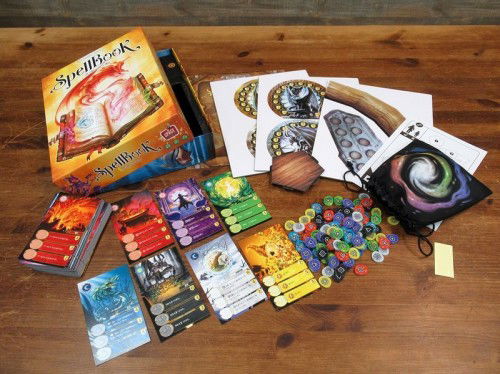
The quality of the game components themselves is fantastic. The materia tokens in the game (which I'll explain further on) are made of acrylic, and, besides beautiful, make the game incredibly unique.
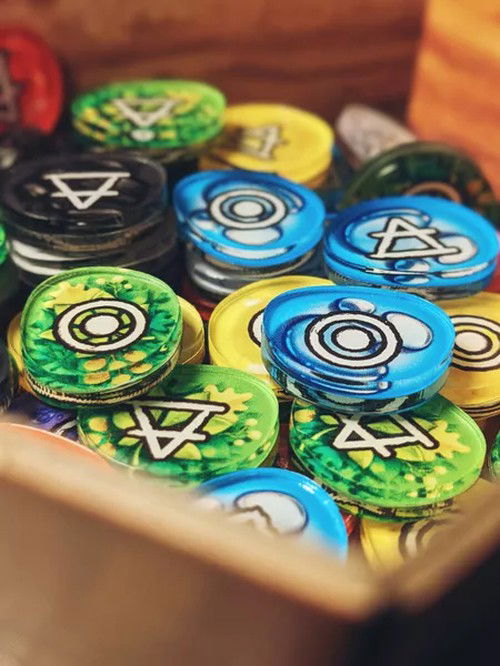
Actually, the overall quality of the entire game is incredible. They really spared no effort in this sense.
Spellbook is easy to learn and to teach. It is really quite simple, but it still involves a lot of strategy and proper planning, like any great game. The idea is relatively simple: you have to learn 7 spells, and, like any great school, there is a time for everything.
Each turn has 3 phases, one for each period of the day: morning, afternoon, and evening. Each phase is unique and has a limit for the things you can do during them.
In the morning, you'll get as much materia as you can. This is the resource you'll spend to learn your spells, and also what you'll use to fed your Familiar, which is like your pet (I'll explain this soon). Later in the game, when you have already learned a spell or two, you can also use a few of them in the morning.
In the afternoon and at the beginning of the game, the only thing you have to do is feed your pet, that is, your Familiar. Each wizard has their own familiar, and there are 4 types of them in Spellbook: a dragon, a gargoyle, a black cat with wings, and an animated wood puppet.
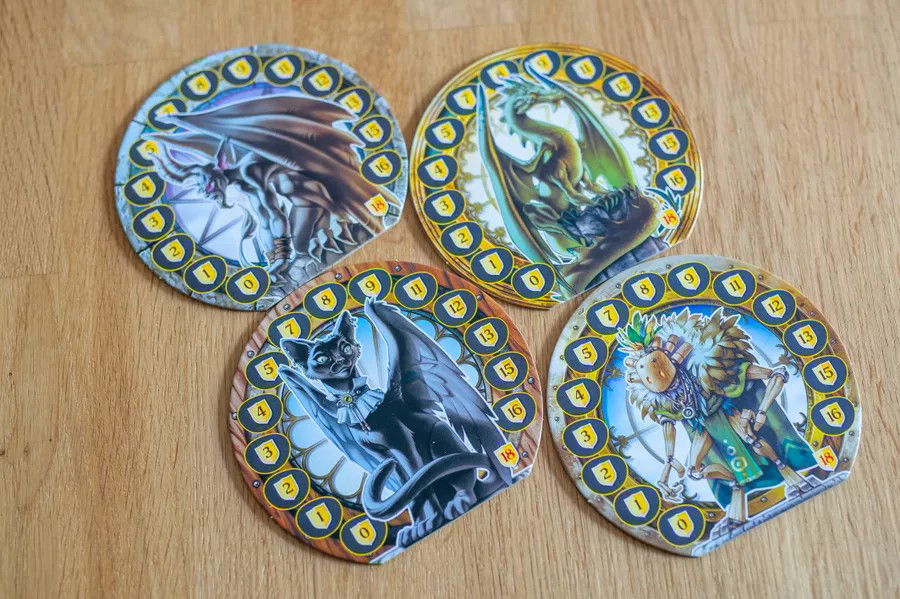
During the game, you'll learn spells that you can use in the afternoon as well and will let you do more than just feeding your Familiar, which, by the way, isn't that bad. After all, it gives you points, and might even win you the game in the end.
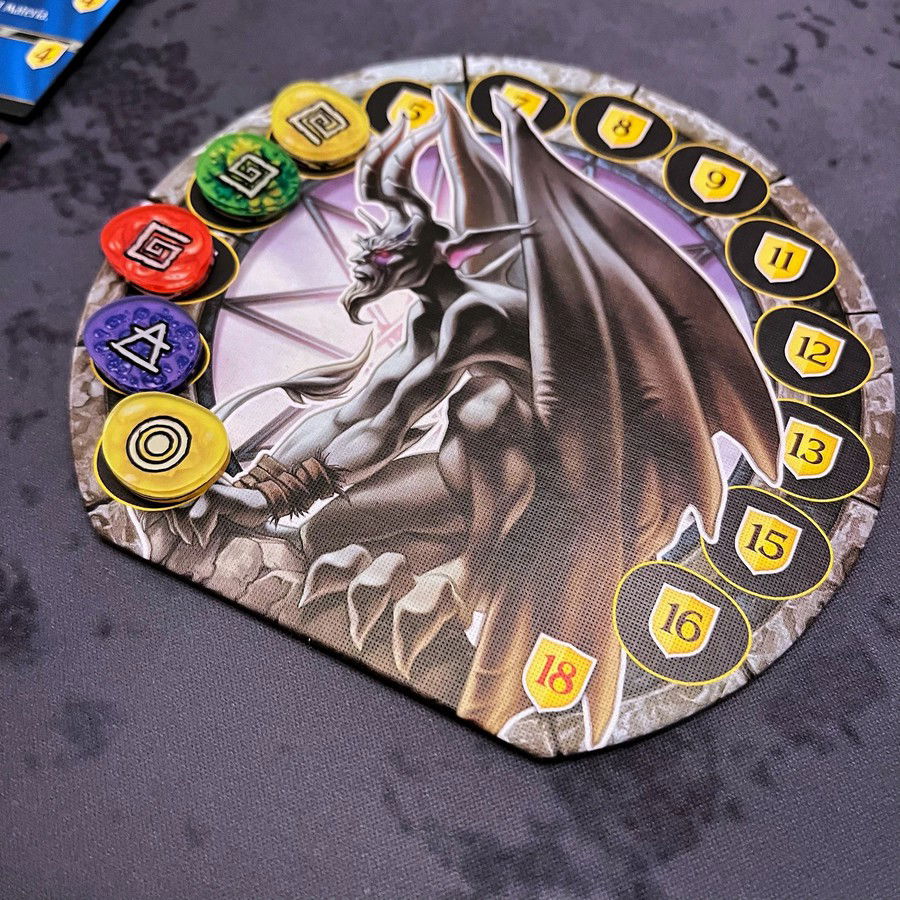
As for the evening, I confess it is the phase I like the most, and it's when everything happens: it's time to learn a spell. This is when you'll spend the materia you collected, and spending them will impact how deeply you learned your spells, that is, how powerful they are.
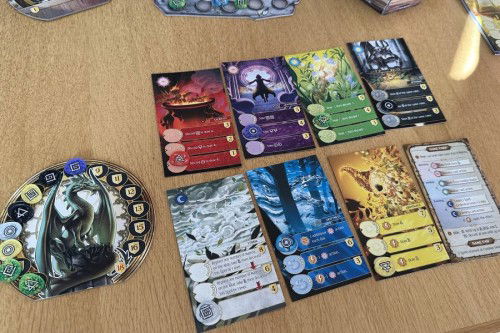
This will not depend solely on how much materia you spend, but also which type of materia, as there are 7 of them in the game: Magma, Poison, Plant, Coal, Vapor, Mercury and Gold. Besides this, each materia comes in 3 different runes, which makes every spell even more special because you'll learn your spells in a different way with each rune.
So, to learn a great spell, you need a good amount of materia, but also a good combination between type of materia and rune. And you thought learning spells was easy.
Obviously that, in the evening, as the game goes on, you'll also be able to use your night spells, besides just learn a new spell.
You probably noticed that, as the game goes on, and you learn new spells, the bigger are your opportunities. And that applies to everything: more actions on your turn, more materia for your stock, ways to feed your Familiar faster… The game gets better after each turn because you'll get more and more opportunities to use your best strategies.
After all 3 phases of the day, it's time to refill your altar with the materia you collected from the vortex.
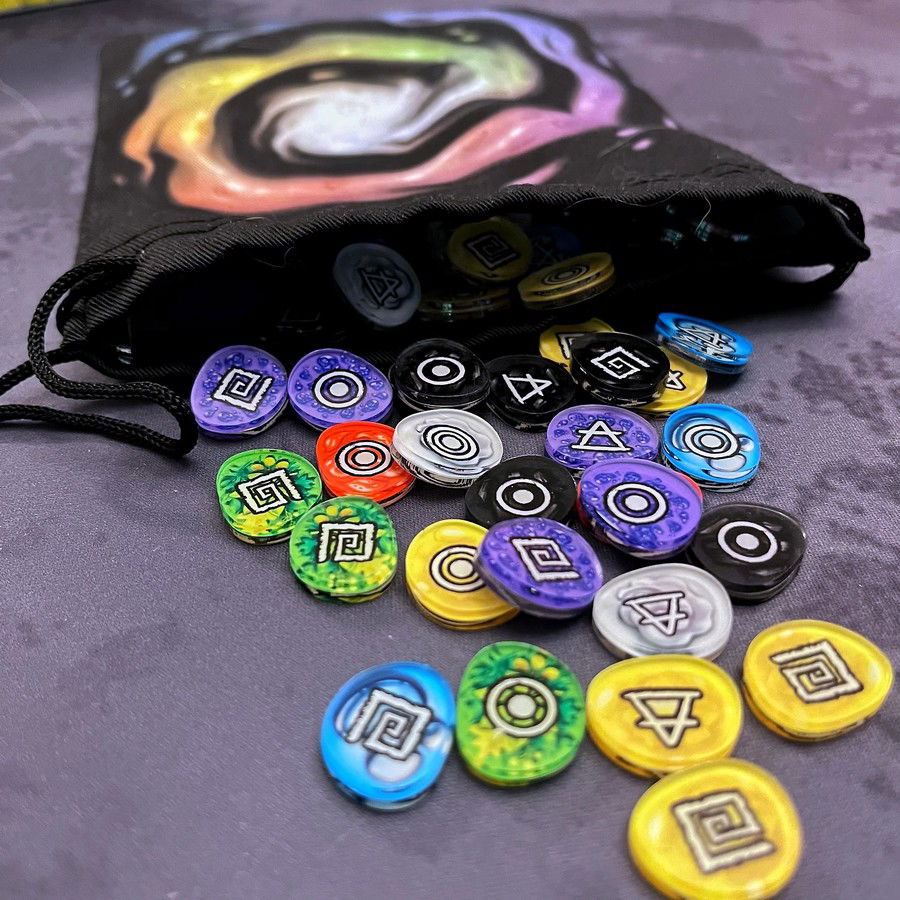
The cool thing about it is that the amount of materia you'll add to your altar depends on how much materia is still on there at the end of the day. This means you don't have an endless amount of materia to spend at will.
This is a turn of Spellbook!
End of the Game
The game ends when a player does one of the following two things:
When either of these two things happen, keep playing until all players have played the same number of turns. Now it's time to add your score, and this is how you'll do it:
Whoever has more points becomes the best wizard and wins the Annual Grant Rite! If there is a tie, the tied player who learned more spells wins. If there is still a tie, whoever has more materia in their altar wins. If there is still a tie, both players win.
It's that simple!
Strategy Tips
Spellbook is a true test of patience because we are all eager to learn spells as soon as possible, and think that's all there is, but, actually, there's way more than that. It demands a lot of strategy and patience.
I say that because I once also only focused on spells and tried to learn them as fast as possible, but they were weak and helped me very little throughout the game. And the goal of the game is precisely the opposite - I learned that by losing!
The idea is to manage your materia and use them wisely to learn stronger spells, as well as using your leftover materia to feed your Familiar in the afternoon. That's right, if you have leftover materia, that's the best strategy because your Familiar takes any type of materia. So, theoretically, you won't have a lot of materia left.
But it's also not that simple: we all have a certain amount of materia we can store, so you really need a lot of patience and strategy to know what to use and when to use it.
This is, actually, what makes SpellBook shine. And the game isn't entirely dependent on how lucky you are when you collect materia from your altar or vortex in the morning: you can mitigate your losses if you're unlucky, but only with a spell, of course. There are many spells that help you throughout the game. That's why I said the game gets better after every turn - it's because you get more options as you play.
And there's more: some spells interact with other spells, that is, you can combo your spells. Setting them up is quite fun. For instance, you might have spells in the morning that help you in the afternoon, which in turn help you in the evening. Then, my friend, if this happens, you can be sure you built the perfect machine.
Knowing how to best collect your materia in the morning also makes a difference, as well as choosing between the Altar or the Vortex. You need to calculate everything to the last detail.
Use your abilities, strategies, feed your Familiar, learn new (and powerful) spells and have fun! That's SpellBook!
Unboxing, Rules, and Gameplay Videos
Check out this unboxing:
See the game rules:
Here's some gameplay:
Teaching Moments
Spellbook is a great game to teach math, pattern recognition, patience, resource management, decision-making, and much more. These are important skills that are useful at any point in your life.
You'll use math for everything in this game whenever you have to manage your materia because we have a limited amount of materia, so we need to use this information with our spell cards to learn them and use them. This is a great workout for your brain, and you'll do this all the time in SpellBook!
Pattern recognition will help you with the runes, as each combination of them triggers a series of effects, from giving you extra cards to saving you a few materia. You'll have to pay attention to these patterns every game because, together, they'll give you many advantages.
I mentioned patience before, and that's something we all must work on in this day and age. We need to use our patience and not spend every bit of materia we have on weak spells if we want to win the game. Is it easy to ask kids to be patient? Of course not, but, as the game goes on, the spell cards themselves will show them that waiting a little longer and learning a stronger spell later on will clearly be a lot more valuable than just learning as many spells as you can as fast as possible.
Managing your resources properly is also essential: you can't spend everything and then not learn any spells because you decided to feed your Familiar with all your materia, and now you're struggling to get the materia you need to learn a new spell. This will often make everyone frustrated and motivated to learn this skill in any way. If not the easy way, you'll learn resource management is important in the hard way.
SpellBook is a choice-based game: you need to decide what to do in the morning, afternoon, and evening. Your choices will dictate your success. Teaching your kids decision-making and handling the consequences of their choices is incredible because it helps us with everything daily.
And finally, when kids understand that one spell boosts another, and that learning new spells is the way to go, they'll notice that there's always progress in SpellBook, as you never "unlearn" a spell. This means knowledge can only bring you forward and make you better. I love SpellBook for this message: all we learn, and our knowledge, they'll always be ours. No one can steal them, and we'll use them to solve other problems in our life. This is what makes SpellBook so special.
The best lesson behind SpellBook is: patience, strategy, and the certainty that learning is always great and helps us in all our future endeavors. This is great for the game as well as our life!
I highly recommend SpellBook for your collection!









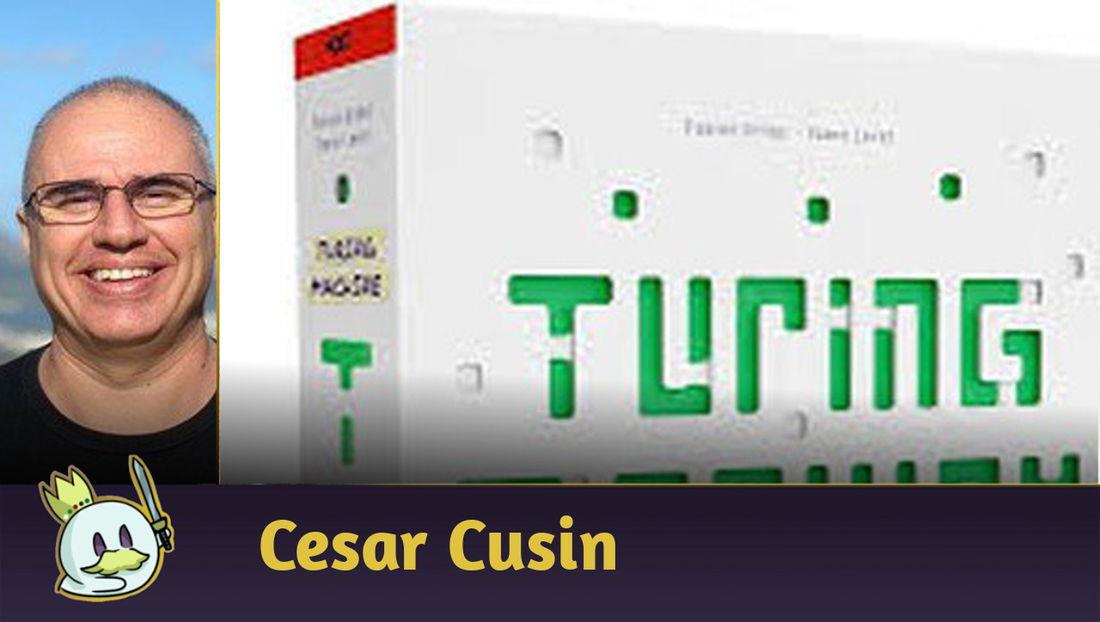




— 评论 0
, 反应 1
成为第一个发表评论的人